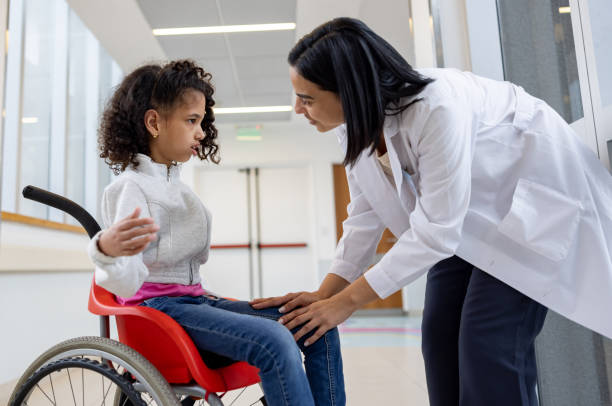Cerebral palsy (CP) is a group of brain disorders that affects posture, coordination, balance and movement. It is a pervasive motor disorder in children; it usually results from brain damage or abnormal fetal brain development. Cerebral palsy causes muscle weakness and makes it difficult for a person to control their body.
Types of Cerebral Palsy (CP)
- Spastic CP: This type affects muscle tone; the muscles become stiff or tight, and movement can be awkward.
- Dyskinetic CP: People with this type of CP have difficulty controlling their muscles, including hands, feet, legs and arms, making it difficult to sit, walk, swallow, or talk.
- Ataxia CP: People with this CP have issues with coordination and balance; it makes it difficult for them to move quickly, and they may be unstable when they walk.
- Mixed CP: This is a combination of two types of CP, usually spastic and dyskinetic CP.
Causes
The exact cause of cerebral palsy is still unknown, but an injury to the developing brain of a child or atypical brain development can damage the parts of the brain that control posture and coordination. Brain damage usually occurs during fetal development, birth or the early years of life.
Some other possible causes of cerebral palsy include:
- Brain infections, such as meningitis and encephalitis.
- Head injury due to car accident, child abuse or fall.
- Gene mutations that result in atypical brain development.
- Intracranial haemorrhage.
- Severe jaundice in infants.
- Infections acquired from the womb, such as herpes simplex or German measles (rubella).
- Neonatal asphyxia (lack of oxygen supply to the brain during labour and delivery).
Symptoms of Cerebral Palsy
The symptoms of this condition vary from one person to another and can also range from mild to severe. Some people may have difficulty walking or sitting, while others may not be able to maintain good posture. However, as a child grows and develops motor skills, the effects of cerebral palsy may start to improve and become less noticeable.
These symptoms also depend on the affected part of the brain. While many children with CP are born with it, it may take some months or years before symptoms will be visible.
Some of the common symptoms of cerebral palsy include:
- Difficulty walking.
- Lack of muscle coordination.
- Stiff muscles and exaggerated reflexes.
- Delays in reaching motor skills milestones such as crawling, sitting up, or rolling over.
- Variations of muscle tone, such as being too stiff or tight
- Tremors or involuntary movement.
- Neurological issues such as blindness, seizures, and intellectual disabilities.
- Excessive drooling and problems with swallowing.
- Delays in speech development and difficulty speaking.
- Relying on one side of the body often, such as reaching through with one hand.
Treatment
The treatment for cerebral palsy includes:
- Assistive aids: Walking aids, eyeglasses, wheelchairs, hearing aids, or body braces.
- Medications: Muscle relaxants such as dantrolene, diazepam, baclofen, tizanidine, etc.
- Surgery: Your doctor may recommend an orthopaedic surgery to improve mobility and relieve pain. It may also correct bone irregularities or release tight muscles. A selective dorsal rhizotomy may also be recommended.
Other treatment options include physical therapy, speech therapy, recreational therapy, occupational therapy, psychotherapy, and social services consultation.



